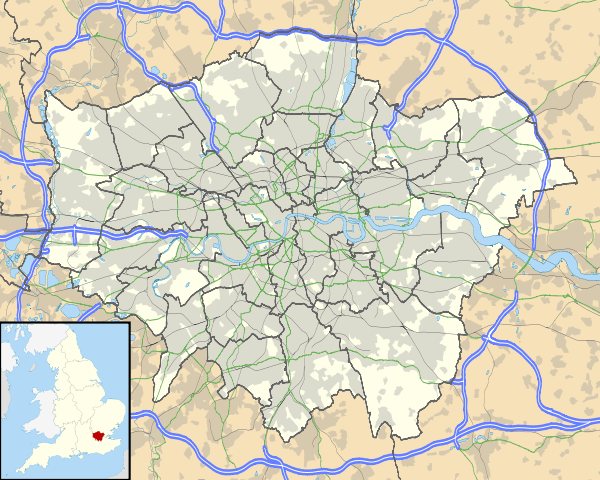Ben Uri Gallery
.jpg) | |
 Location within London | |
| Established | 1915 |
|---|---|
| Location |
Boundary Road London, NW8 |
| Coordinates | 51°32′15″N 0°11′07″W / 51.5375°N 0.1854°W |
| Public transit access |
|
| Website |
www |
Ben Uri Gallery, The Art Museum for Everyone, is a registered museum and charity currently sited at 108a Boundary Road, off the famous Abbey Road in St John's Wood, London, England.[1] It is one of the rare museums in Europe dedicated to exploring the work and lives of émigré artists in London.[1]
History
The Ben Uri Art Society was founded in the East End of London in 1915 by the Russian emigre artist Lazar Berson to provide an art venue for Jewish immigrant craftsmen and artists unable to gain access to mainstream artistic societies at that time, due to traditional obstacles faced by all migrant minorities. Ben Uri was founded in the vein of the Bezalel School created 9 years earlier in 1906 in Jerusalem. It was named after Bezalel Ben Uri, the craftsman who designed and built the Ark of the Covenant.[1] Between 1926 and 1933 the president of the Ben Uri Art Society was renowned painter Leopold Pilichowski from Poland (1869–1934).[2]
Permanent Collection

In its permanent collection, Ben Uri has about 1,300 artworks, and is seeking a site in Central London to house and display them, but its present location is only large enough for blockbuster temporary exhibitions including the series on the Whitechapel Boys; Cross Purposes, tracing the use of the Crucifixion motif during the 20th century and recent contemporary art; in June 2012 Dodo, re-discovering an artist from Berlin in the Weimar 1920s and 30s; followed in October by a survey of 40 years work by the American artist Judy Chicago.[1]
Further reading
- Schwab, W. M. (1987). Jewish artists : the Ben Uri Collection : paintings, drawings, prints and sculpture. London: Ben Uri Art Society. OCLC 233681034.
References
- 1 2 3 4 "Ben Uri Museum of Art". Homepage. Ben Uri. Retrieved 8 August 2012.
- ↑ Mirjam Rajner (2010). "Pilichowski, Leopold". The Yivo Encyclopedia of Jews in Eastern Europe. YIVO Institute for Jewish Research. Retrieved 6 August 2012.